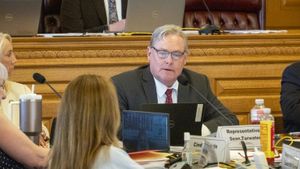The American Civil Liberties Union (ACLU) of Michigan has launched a legal confrontation with the University of Michigan, alleging unconstitutional actions against pro-Palestinian protesters. The lawsuit, filed alongside the Sugar Law Center for Economic and Social Justice, targets the university's alleged use of heavy-handed tactics to silence dissent on its Ann Arbor campus.
At the heart of the complaint is the allegation of disproportionate and vague enforcement of trespass sanctions against pro-Palestinian demonstrators, actions which plaintiffs argue violate their First and Fourteenth Amendment rights. The suit was filed on behalf of several affected students, including Jonathan Zou, who has faced severe repercussions for participating in protests following the outbreak of violence between Israel and Hamas.
According to the lawsuit, the university has established policies which enable campus police to issue trespass bans with little explanation. These bans, typically lasting up to one year, strip students of their rights to not only protest but also attend classes, divulging serious concerns over free speech. "I have a constitutional right to be on campus, go about my daily life and to participate in protests against the university," said Zou, expressing frustration over the constraints imposed upon him. "It’s absurd..."
The backdrop of these legal events traces back to large-scale protests which surged nationwide, particularly after the events of October 7, 2022, when demonstrators demanded various responses from the university, including financial divestment from Israel. Zou was arrested on this date after using a megaphone during one such demonstration, now carrying the weight of lasting consequences.
Allegations against the university indicate it has employed the use of trespass bans—considered by many as retaliatory measures—against individuals simply exercising their right to protest. Loren Khogali, the executive director of ACLU Michigan, commented, "The Constitution does not permit any public institution... to crush expressions of dissent." This highlights the mounting tensions on campuses, with students and activists arguing they are being ostracized for legitimate expressions of political opinion.
Zou's experience contrasts sharply against the university's professed appreciation for its history of activism. "The university says it appreciates this history of activism, but it will arrest students, ban students, surveil students and repress them through legal or school disciplinary means," he stated, conveying the disillusionment felt by many students involved. The university's police reportedly have enforced trespass laws to such extremes, placing bans on areas designated as public spaces without formal charges against the students.
The ACLU's lawsuit not only seeks to reverse such bans for current plaintiffs but also demands corrections to the university's approach to free speech and protest rights. Liz Jacob, attorney with the Sugar Law Center, articulated the university's actions as actively targeting students’ speech. She asserted, "...trespass bans to target, attack, and silence the speech of protesters." This is echoed within the suit, questioning the propriety of bans issued without full due process protections adhered to, such as proper hearings or evidence considering the actions of those accused of misconduct during protests.
The ramifications of this lawsuit could resonate widely across campuses, especially at institutions like the University of Michigan, home to one of the nation’s largest Arab-American communities and significant Jewish representation. Recent tensions have prompted varied responses from university officials, including legal scrutiny over collective fundraising efforts aimed at supporting Palestinian causes.
Pro-Palestinian activism surged following violent escalations abroad but has been met with increasing arrests and accusations of misconduct on campuses, which has led some activists to fear they are being preyed upon by institutional powers. President Biden’s administration has faced scrutiny for its response to both pro-Palestinian and antisemitic sentiments, which complicates the national discourse surrounding such demonstrations.
Despite the tension on campus, many students remain resolute, propelled by the charges against their rights to protest and express dissent. The ACLU has taken the stance to not only advocate for those involved but aims to safeguard the broader array of student rights within educational structures. With the lawsuit filed and the university’s initial refrain from comment, students and legal observers are left wondering how this confrontation will influence campus activism and the climate for free speech fundamentally.
This case encapsulates the contentious intersection of free speech and university policies, paving the way for potentially transformational legal precedents concerning students’ rights to protest and the limitations institutions may place on them. How it concludes will certainly garner attention across the higher education sector.



